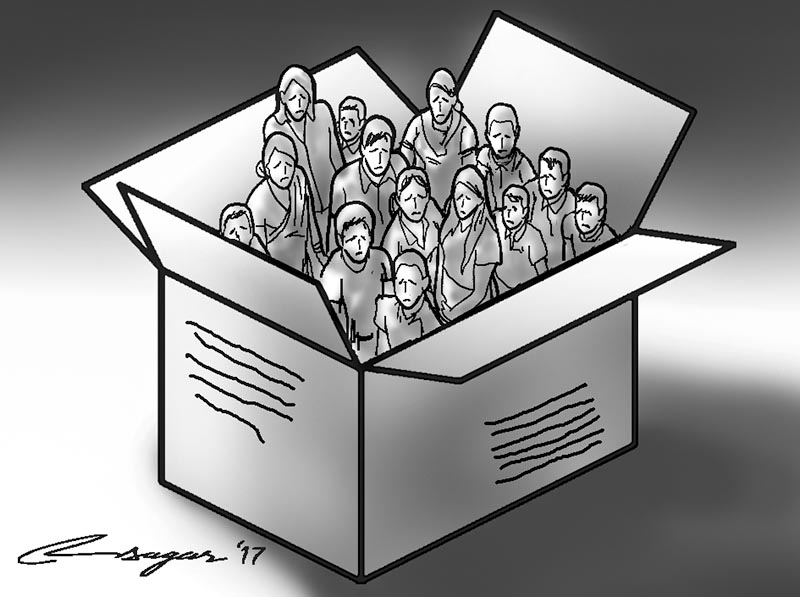Trafficked on Myanmar passports via Nepal, Indian housemaids struggle to return home
AIZWAL: The 17-year-old recalls being excited as she took the car journey and bus ride from her home in northeast India and across the border into Myanmar.
But a few weeks into her stay in Yangon, a phone call to her distraught mother suddenly made her fearful.
"She told me I had illegally crossed into another country," she said. "My family said I should come back and their tone made me very scared."
An agent - a man she had seen around her neighbourhood but "didn't know too well" - had housed her in a Yangon hostel, and had promised to get her a fake Myanmar passport and a well paid job, she told the Thomson Reuters Foundation.
She and seven other girls from northeast Indian state of Manipur had crossed borders in June and were holed up in Yangon for three months, waiting to be moved on to jobs as housemaids in Singapore or Malaysia with their new travel documents.
They were among hundreds who transit through Myanmar's biggest city - an emerging hub for traffickers seeking to send Indian girls to Southeast Asia to become domestic workers, said Hasina Kharbhih of Impulse NGO Network, a charity that has helped repatriate many trafficking victims.
Travelling on illegal documents leaves the already vulnerable young women with little protection, she said.
Since Myanmar's democratic government took over in 2016, it has been easier to travel through the country and traffickers have stepped up activity, according to a recent report by the anti-trafficking unit in northeast Indian state of Mizoram.
"The Myanmar route to South East Asia is seeing increasing trafficking because for many miles on both sides of the border, the people are the same - speaking the same language, looking the same," said Thianghlima Pachuau, head of the Mizoram police force.
"We have had tragic cases in the region. In one instance the girl died in Singapore but could not be brought home (to India) since her documents indicated she was a Myanmar national. Her parents never got closure."
BORDER ROUTES
Years of ethnic violence and armed conflicts in northeast India have made it a trafficking hotspot, campaigners say. The region is a source, destination and transit point for girls being trafficked into brothels or domestic servitude.
The underdeveloped region is bordered by China, Nepal, Bangladesh, Myanmar and Bhutan.
Many of these porous borders are crossed every day by thousands of people, who share similar ethnic, religious, linguistic and cultural characteristics, security officials say.
Traditionally, traffickers have used Nepal as a transit point to send women to the Gulf countries. But trafficking through Myanmar is now on the rise, police say.
Moreh, a thriving business hub on the India-Myanmar border, is the first stop for girls trafficked from the northeastern states.
"The border crossing is easy because agents have family and friends along border villages, who shelter the girls and get them across," Pachuau said.
"Once they cross over, they are told not to reveal their Indian identities and then they are just lost."
Now back home, the 17-year-old high school dropout - who did not want to reveal her name - remembers praying three times a day in her Yangon room as she waited for the agent to get her a passport and ticket to fly to Singapore to work as a maid.
"I thought I was escaping to a better place. I was wrong," she said.
JOB OFFERS
Jervis Lalramnghaka runs a recruitment agency in Aizwal, the capital of Mizoram. His is one of the bigger agencies in the city, that scouts for young women for jobs as domestic help.
"Most of the girls are in their early twenties and divorced," he told the Thomson Reuters Foundation.
"We guarantee them an income of up to 25,000 rupees ($390) a month and a two year contract. But the first four months' salary comes to me as fees."
He sends young women to Singapore, Malaysia and sometimes Macau on Indian passports only, he said, admitting it was a complicated, bureaucratic process compared to acquiring fake travel documents in Myanmar.
Along the main road that winds through Aizwal town, posters advertising "housemaid jobs and good salaries" are everywhere. Each has the number of an agency at the bottom.
Many such unregistered agencies teach the girls a smattering of English, some basic housekeeping skills and send them to Myanmar as a jumping off point, said Lallianmawia Mawitea, head of the Mizoram anti-trafficking unit.
"Getting a passport and travel documents in Myanmar is easy for the agents," he said.
"The girls don't realise that when they travel on the fake passport of another country, there is very little we can do to help them when they are abused or in trouble."
BILATERAL TIES
The rescue of the 17-year-old in September, along with seven other Manipuri girls from Yangon, was a test case for authorities in both countries as they tried to repatriate them.
"Rescuing the Indian girls from Manipur was easy but the repatriation was a learning lesson," said Maung Maung Win of the Young Men's Christian Association in Yangon.
The charity mortgaged their property to pay for the indemnity bonds required to release the girls, who had been booked under the Burma Immigration Act of 1947 for illegally entering Myanmar, he said.
A new cooperation agreement between India and Myanmar aims to plug the gaps in this trafficking route.
Now in its final stages of approval, the agreement looks at ways to protect trafficking victims, ensure early repatriation and to prosecute traffickers.
"A coalition of organisations across the border is essential to ensure repatriation of trafficking victims," said Kharbhih, who was part of the discussions on the bilateral agreement.
"In the case of the Manipuri girls, we worked with our partners in Yangon and pushed hard to get them home. It would have been easier if the protocol was in place."






